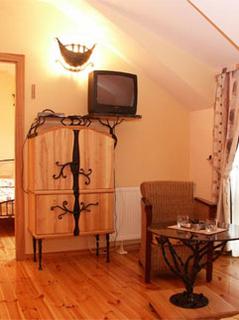The central bank governor is warning that the euro is not the cure for all Poland's ills
Published:
19 January 2005 y., Wednesday
The central bank governor Leszek Balcerowicz is warning that the euro is not the cure for all Poland's ills.
Leszek Balcerowicz believes the government should focus on reforms to yield long-term economic growth, rather than rushing to join the single currency.
"I never said that Poland should enter [the eurozone] at any cost. I said the best strategy is to fulfill conditions for euro entry in a rapid and sustained way," said Balcerowicz, while attending a meeting of central bank governors last week. "The process of EU enlargement was conducive to reforms. The idea of euro entry should be a similar incentive."
Balcerowicz has frequently said that eurozone entry is a political, rather than an economic issue, and that taxes and spending are currently too high for single-currency membership. He also said that tougher reforms were necessary to free Poland from the shackles of long-term high unemployment. In the 1990s, his economic treatments helped Poland recover from the collapse of communism.
"It will pay for Poland to undergo fiscal consolidation," he said. "Unemployment in Poland is not due to over-excessive market-oriented reforms. All of the reasons are structural. There has been some labor market liberalization but I think we need much more decisive action."
Despite his comments, the Civic Platform (PO) party, which is expected to win the next general election, says eurozone entry by 2009 will be a key objective for the party. "Our government will have the strategic goal of adopting the euro by 2008 or 2009. We will do everything to make sure it happens," said Zbigniew Chlebowski, deputy head of the Platform's parliamentary group.
Chlebowski also hinted at the future government's economic policy plans, saying major reform initiatives-such as its flat-tax proposals-would be launched at the start of 2007, not in 2006 as earlier signaled. He also said that limiting the budget deficit in 2006 would be difficult because of the outgoing government's spending promises but that fiscal policy would tighten from 2007.
Šaltinis:
wbj.pl
Copying, publishing, announcing any information from the News.lt portal without written permission of News.lt editorial office is prohibited.
The most popular articles
 On 31 August 2009 in a non-public way AB Bank SNORAS issued the emission of perpetual debt securities included into the bank capital amounting to LTL 72.5 million.
more »
On 31 August 2009 in a non-public way AB Bank SNORAS issued the emission of perpetual debt securities included into the bank capital amounting to LTL 72.5 million.
more »
 The European Commission, through its longstanding cooperation with the US and Canada, announces the launch of 33 new and innovative projects involving universities and training institutions on both sides of the Atlantic.
more »
The European Commission, through its longstanding cooperation with the US and Canada, announces the launch of 33 new and innovative projects involving universities and training institutions on both sides of the Atlantic.
more »
 Today at the VII World Congress on Alternatives and Animal Use in the Life Sciences in Rome, the European Commission and the European cosmetic industry presented their joint financial effort for research into alternative safety testing methods.
more »
Today at the VII World Congress on Alternatives and Animal Use in the Life Sciences in Rome, the European Commission and the European cosmetic industry presented their joint financial effort for research into alternative safety testing methods.
more »
 SEB Bank, the largest bank in Lithuania, invests almost LTL 4.6 million in to the upgrade of its data transmission network.
more »
SEB Bank, the largest bank in Lithuania, invests almost LTL 4.6 million in to the upgrade of its data transmission network.
more »
 The World Bank’s Board of Executive Directors today approved a credit of US$ 36.6 million equivalent of additional financing for the Lifeline Road Improvement Project for Armenia.
more »
The World Bank’s Board of Executive Directors today approved a credit of US$ 36.6 million equivalent of additional financing for the Lifeline Road Improvement Project for Armenia.
more »
 The Executive Board of the International Monetary Fund (IMF) today completed the first review of Latvia's performance under an economic program supported by a 27-month Stand-By Arrangement.
more »
The Executive Board of the International Monetary Fund (IMF) today completed the first review of Latvia's performance under an economic program supported by a 27-month Stand-By Arrangement.
more »
 The Commission has today decided to close the formal investigation procedure into the privatisation and restructuring of Austrian Airlines concluding that the restructuring following its sale to Lufthansa is compatible with community law.
more »
The Commission has today decided to close the formal investigation procedure into the privatisation and restructuring of Austrian Airlines concluding that the restructuring following its sale to Lufthansa is compatible with community law.
more »
 Ben Bernanke's reappointment as head of the Federal Reserve did not come as a surprise, but Wall Street still responded with the proverbial thumbs up.
more »
Ben Bernanke's reappointment as head of the Federal Reserve did not come as a surprise, but Wall Street still responded with the proverbial thumbs up.
more »
 Over I half-year 2009 accommodation establishments had by 22 per cent less guests.
more »
Over I half-year 2009 accommodation establishments had by 22 per cent less guests.
more »
 In the first such transaction in Russia, carbon credits generated by utilising gas which would otherwise be flared at an oilfield in eastern Siberia are to be purchased through a carbon fund set up by the EBRD and the European Investment Bank (EIB), the Multilateral Carbon Credit Fund (MCCF).
more »
In the first such transaction in Russia, carbon credits generated by utilising gas which would otherwise be flared at an oilfield in eastern Siberia are to be purchased through a carbon fund set up by the EBRD and the European Investment Bank (EIB), the Multilateral Carbon Credit Fund (MCCF).
more »